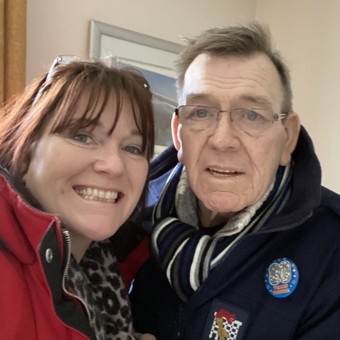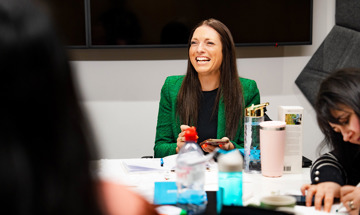Caring has been a huge part of my life; I have cared for both my parents over a 10-year period. In 2010 my Mum was diagnosed with Alzheimer’s and at that time was still well enough to stay at home with my Dad, with my support. Over time she deteriorated and needed help with everything from personal care to eating. In 2016 she moved to a nursing home as she needed more support than my Dad and I could provide. She received great care until she passed away last March.
When Mum went into care My Dad deteriorated. He had developed periods of extreme delirium and confusion and was diagnosed with Parkinson’s Plus Syndrome with Lewy Body Dementia. He stayed at home for as long as possible, until it was too much of a risk for him to be on his own, because he would fall and could not get up. In 2019 he reluctantly admitted he couldn’t cope and after 58 years in our family home – we found residential care for him. He thrived there, being looked after by such experienced and caring staff until we sadly lost him to Covid-19 last April.
Being fully available was vital to my role as a carer and I was caring remotely at times. Tolerance, organisation, resilience and patience are all essential skills in being an effective carer. Some days I was resilient and took things in my stride, some days it took every ounce of energy just to do the basics without falling apart. Time pressure is hard especially if you’re working or have children to take care of as well. The feeling of being pulled in all directions made me feel that everyone got something, but no one got the best.
When I had to help manage my parents’ household affairs, dealing with multiple organisations seemed relentless and very often there were blockers that they didn’t seem to want to help with. GDPR was a big problem for me especially when my folks were deemed to have capacity but were having a confused day. I couldn’t deal with things on their behalf, but they couldn’t do it themselves. I can’t stress enough how important it is to obtain a power of attorney in advance to prepare for these circumstances. You don’t know when something can happen, so my advice is be prepared and get it sorted now, so you always know it’s there if you need it.
I was able to utilise our company carers policy for appointments and necessary time out and flexible working. Sometimes I had to work from my parents’ home just to be with them. It was invaluable in keeping an eye on them, but just to have someone there to keep them company was just as important and it meant I could also enjoy time with them, rather than just caring. I could be so wrapped up in caring that I forgot they were my parents and just enjoyed their company.
Sometimes it’s the simple things that make a big difference for carers, such as at British Gas we introduced carers’ account flags, which means our customer teams can easily identify those acting on someone’s behalf and help them when making appointments or dealing with their accounts. We also signpost them to advice on dealing with their loved one’s affairs, and how organisations like Carers UK can support them.
I would love the Government to acknowledge (in more than appreciative sentiments) the amount of strain carers takes off the NHS and social care system. Perhaps support for smaller businesses to keep people in work or move to part time. The strain of caring weighs so heavy that many must leave work, but the carers allowance is in no way a substitute for a salary. I couldn’t have supported my family on carers allowance.
I’m happy with the support I’ve received from Centrica - In a nutshell, a caring company retains good staff and being supported fosters a huge amount of loyalty. I know I would go above and beyond for my manager because she was always so supportive. It strengthens teams if everyone understands and supports each other.
Find out here about how we're helping Carers UK to encourage companies to support customers with caring responsibilities.


Case Study
Centrica's Market Leading Commitment to Trans Inclusion
Our people

Case Study
Chris O'Shea: The Employment Rights Bill will be good for business.
Our people

Case Study
In conversation with... Victoria Belkhyate
Our people

Case Study
Meet the Fathers of Centrica
Our people

Case Study
Black History Month: Reclaiming Narratives
Our people

Case Study
The Working Parents of Centrica
Our people